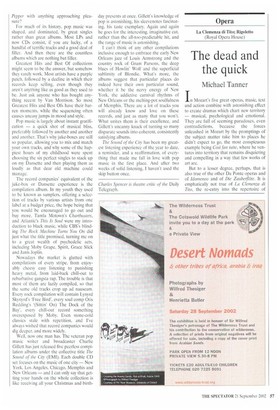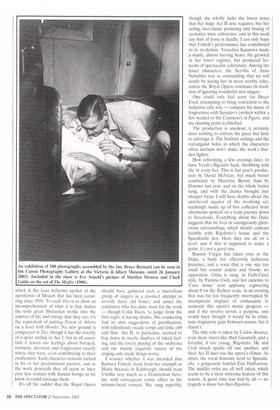The dead and the quick
Michael Tanner
In Mozart's five great operas, music, text and action combine with astonishing effect to create dramas which chart new territory — musical, psychological and emotional. They are full of seeming paradoxes, even contradictions, because the forces unleashed in Mozart by the promptings of the subject matter take him to places he didn't expect to go, the most conspicuous example being Cosi fan tutte, where he ventures into territory that remains disquieting and compelling in a way that few works of art are.
But to a lesser degree, perhaps, that is also true of the other Da Ponte operas and of Idomeneo and of Die Zauberflote. It is emphatically not true of La Clemenza di Tito, the re-entry into the repertoire of which is the least welcome upshot of the apotheosis of Mozart that has been occurring since 1956. To exalt Tim is to show an incomprehension of what it is that makes the truly great Mozartian works into the sources of life and energy that they are; it's the equivalent of putting Timon of Athens on a level with Hamlet. No new ground is conquered in Tito, though it has the novelty of a quiet ending to Act I; but in all essentials it leaves our feelings about betrayal, tornness, devotion and forgiveness exactly where they were, even contributing to their ossification. Each character remains locked in his or her predominant passion, and as the work proceeds they all seem to have ever less contact with human beings as we know or could envisage them.
It's all the sadder that the Royal Opera should have gathered such a marvellous group of singers in a doomed attempt to revivify these old bones, and under the conductor who has done most for the work — though Colin Davis, to judge from the first night, is having doubts. His conducting had its own suggestions of petrification, with relentlessly steady tempi and little ebb and flow. Act IL in particular, seemed to bog down in sterile displays of faked feeling, and the lovely playing of the orchestra and the mainly exquisite nature of the singing only made things worse.
I wonder whether it was intended that Barbara Frittoli, fresh from her triumph as Maria Stuarda in Edinburgh, should treat Vitellia very much as a Donizettian heroine, with consequent comic effect in the solemn-faced context. She sang superbly, though she wholly lacks the lower notes that her huge Act II aria requires; but her acting, neo-classic posturing and hissing of recitative were subversive, and in this work any hint of irony is deadly; I can only hope that Frittoli's performance has contributed to its re-demise. Vesselina Kasarova made a manly, almost moving Sesto; she growled in her lower register, but produced festoons of spectacular coloratura. Among the lesser characters, the Servilia of Anna Netrebko was so outstanding that we will surely be seeing her in more worthy roles, unless the Royal Opera continues its tradition of ignoring wonderful new singers.
One could only feel sorry for Bruce Ford, attempting to bring conviction to the ludicrous title role — compare his music of forgiveness with Sarastro's (written within a few weeks) or the Countess's in Figaro, and my opening point is clinched.
The production is anodyne; it certainly does nothing to enliven the piece but little to sabotage it. The Stalinist settings and the rectangular holes in which the characters often declaim don't make the work's burden lighter.
How refreshing, a few evenings later, to have Verdi's Rigoletto back, throbbing with life in every bar. This is last year's production by David McVicar, but much better conducted by Maurizio Bertini than by Downes last year, and on the whole better sung, and with the drama brought into sharper focus. I still have doubts about the unrelieved squalor of the revolving set, seemingly made up of bits collected from allotments spotted on a train journey down to Sevenoaks. Everything about the Duke suggests that he lives in outrageously glamorous surroundings, which should contrast harshly with Rigoletto's house and the Sparafucile den. Here they are all on a level, and if that is supposed to make a point, it's not a good one.
Ramon Vargas has taken over as the Duke, a burly but effectively lecherous presence, and a voice that is one size too small but sounds ardent and brooks no opposition. Gilda is sung, in Galli-Curci style, by Patrizia Ciofi, and her cadenza to 'Caro nome. won applause registering about 8 on the Richter scale, in an evening that was far too frequently interrupted by intemperate displays of enthusiasm to maintain this opera's manic progress — and if the revolve serves a purpose, one would have thought it would be to eliminate stagnatory gaps between scenes, but it doesn't.
The title role is taken by Carlos Alvarez, even more insect-like than Gavanelli, and a forceful, if too young, Rigoletto. He and Ciofi struck sparks off one another, and their Act II duet was the opera's climax. As often, the vocal honours went to Sparafucile, a gorgeously baleful Eric Halfvarson. The smaller roles are all well taken, which seems to be a most welcome feature of this season. A great time was had by all — no tragedy is more fun than Rigoletto.











































































 Previous page
Previous page